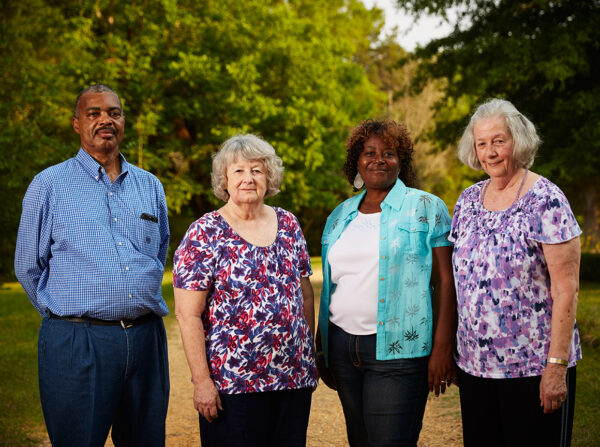Landfill Drops Defamation Lawsuit Against Community Activists, Agrees to Environmental Protections
ACLU Represents Residents of Low-Income, Majority Black Alabama Town in Settlement Victory
MOBILE, Ala. — The American Civil Liberties Union announced today that a settlement agreement has been approved by the federal court in a defamation lawsuit filed by a waste company against four community activists who voiced opposition to a coal ash landfill in their small town.
The ACLU represented the defendants, all residents of Uniontown, Alabama — a poor, predominantly Black town with a median per capita income of around $8,000 — who were sued for $30 million by Georgia-based Green Group Holdings because the residents object to the coal ash that the company keeps in a landfill in a residential area of Uniontown.
Under the settlement, the company agreed to permanently drop the lawsuit and committed to addressing future disagreements with community dialogue first rather than litigation. The landfill also agreed to two permanent environmental protections: it will provide the public with notice before the landfill receives any potentially toxic waste products, and the landfill will continue to use the current EPA-approved standards to seal off any future shipments of coal ash.
“No one should have to fear a multi-million dollar lawsuit just for speaking up about their community — but our clients did,” said Lee Rowland, a senior staff attorney with the ACLU’s Speech, Privacy, and Technology Project. “Fortunately, as they do in the face of all injustice, our clients fought back. This settlement reaffirms our clients’ — and everyone’s — constitutional right to speak out and fight for health and justice in their community. In addition to advocating for community health and justice, our clients also became heroes of the First Amendment.”
In 2009, Arrowhead Landfill in Uniontown became the new host for millions of cubic yards of coal ash after it spilled out of a landfill in Tennessee following a catastrophic dike failure. The coal ash in Tennessee contaminated land, rivers, reservoirs, and shore areas surrounding the landfill with arsenic and lead, leading the Environmental Protection Agency to conclude that there was a potential “imminent and substantial endangerment to the public health.”
Residents of Uniontown organized in opposition to what they saw as a racial and environmental injustice, speaking out against the risk to their environment and health, as well as the location of the landfill, which is across the street from several homes and next to one of the town’s historic Black cemeteries.
Some 35 residents filed a complaint with the EPA’s Office of Civil Rights under Title VI of the Civil Rights Act of 1964. The complaint alleges that the Alabama Department of Environmental Management violated their civil rights by allowing the Arrowhead Landfill to locate in their predominately Black neighborhood without adequate protections for the health of residents or the environment.
Some citizens also organized a concerned citizens’ group called Black Belt Citizens Fighting for Health and Justice, which created a Facebook page that publishes concerns about risks to their environment and health. Green Group sued over the Facebook posts, which included statements such as “we should all have the right to clean air and clean water” and “It affected our everyday life.”
“In Uniontown, we are fighting for so much: our health, our environment, clean air, clean water, and access to justice. And if we want to fight, first we need to speak out about what is happening in our community. We’re not afraid to speak out, and I want people to know that they shouldn’t be afraid either,” said Esther Calhoun, one of the Uniontown residents Green Group accused of defamation.
The site of the Arrowhead Landfill was once a plantation where Uniontown residents’ Black ancestors — including both enslaved people and tenant farmers — picked cotton, and some are buried in graves near the site. Some Black residents now say that they are unsure about the location and treatment of their ancestors’ remains.
The population of Uniontown is 91 percent Black, and 48 percent live below the poverty line. In addition to being the site of the Arrowhead Landfill — the biggest municipal waste dump in the state — it is also the site of a sewage lagoon, catfish farms, and a large cheese processing plant.
“Uniontown’s numerous problems reflect policy failures at every level of government to value Black residents’ lives and health,” said Dennis Parker, director of the ACLU’s Racial Justice Program. “And perhaps the greatest tragedy is that people like our clients are expected to bear this oppression silently. This settlement reaffirms every activist’s right to fight for racial and environmental justice in his or her community — out loud and without fear.”
The defendants in the case are represented by the ACLU; the ACLU of Alabama; Charles S. Sims and Carl Forbes of the law firm Proskauer Rose; and Alabama attorneys Bill Dawson and Matthew Swerdlin.
The settlement agreement is here:
/sites/default/files/field_document/consolidated_joint_motion_to_dismiss_claims_with_prejudice_and_settlement_agreement_ocr.pdf
A joint statement from all parties to the case is here:
/letter/joint-statement-parties-dismissal-lawsuit
More information and other case documents are here:
/locals-v-landfill



